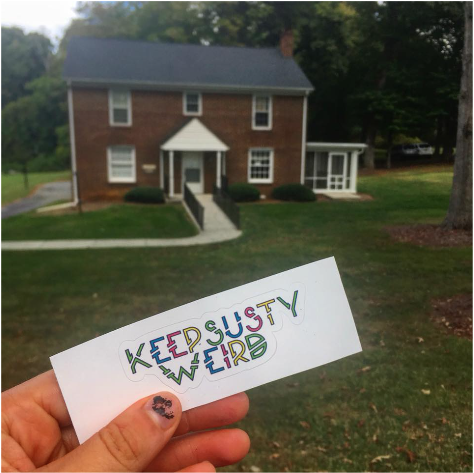Located at 1157 Polo Road, the Sustainability Theme House, or as its residents call it, “Susty,” stands as Wake Forest’s longest-running theme house.
Susty is what Theme Program Assistant Lando Pieroni describes as a project based around not just an ecological purpose but “one that has social implications.”
“To further understand how to reduce our footprint we must start by creating meaningful and sustainable relations,” Pieroni said. “The purpose of this house is to promote inclusivity through sustainable relations and to promote eco-conscious activities.”
A program assistant, Pieroni is in charge of having programs for the house based around sustainability. Part of the Susty mission and his own is creating a cohort of people who are from different backgrounds and have different ideas but all care about sustainability.
Only then can Susty promote an active learning experience around sustainability for its members.
Susty houses 10 students this year, many of whom are involved in various organizations on campus. Pieroni believes that by having members of Susty involved across campus, it can promote sustainable endeavors beyond the house.
One of the earliest programs that has become known on campus for both its free food and the elaborate invitation emails has been Spaghetti Night.
The residents of Susty cook a heap of spaghetti and build a space for dialogue and community to form. The night consists of a chaotic kitchen, a ton of people all around and spaghetti for days (all gluten-free and vegan of course.) The program has provided junior Maggie Powell access to “feel comfortable in the sustainability community” since her first year. This is Powell’s first year living in the house.
“Susty is definitely the most ‘sustainable’ community I’ve been a part of,” she said.
She also said that the mutual respect the residents have for each other has resulted in a her gaining more sustainable friendships.
Beyond the community Susty builds, it also acts as a hub for what Powell called “sustainability-type people.” This hub allows the community to better work and collaborate on projects and ideas revolving around sustainability.
One of the ideas that is brought up often, especially on Spaghetti Night, is how students’ diets impact the environment. Pieroni explored this idea his junior year when he became a vegetarian.
“It was an insightful experience because you really start to understand the value of what you’re eating,” Pieroni said.
He added that while he isn’t a vegetarian now, he keeps himself accountable for how much processed or red meat he eats.
Powell currently does not eat red meat or seafood. In high school, she began to see the impact of her diet on the environment.
“As I tied more of my identity with environmentalism, I tried to make my diet more sustainable,” she said.
Powell, who was vegan for a year and a half, said, “100 percent of my shift in diet can be attributed to my passion for sustainability.”
When asked about the impact of food consumption on the environment, Brian Cohen, the program coordinator for the Office of Sustainability said, “Our behaviors associated with food consumption are a major contributor to climate change and one that is overlooked.”
According to Cohen, it takes around 2,000 gallons of water to produce one pound of beef. This means that cutting one pound of beef from your diet is equivalent to skipping over 100 showers.
Cohen recommended that students familiarize themselves with what they are eating and the impact of their diets.
“Eating a more plant-forward diet, eating local and organic products are all decisions that individuals can make that can have a major positive impact on the environment,” Cohen said.
Susty’s residents are doing just this — by visiting the 100 percent organic farmers’ market on Saturday morning to having their biweekly Spaghetti Night, Susty is trying to take better care of the planet and each other.
“At the end of the day, the people who started the Susty House and those who are now living in it all have had the same intentions of creating an ecologically and civically conscious community,” Pieroni said.













